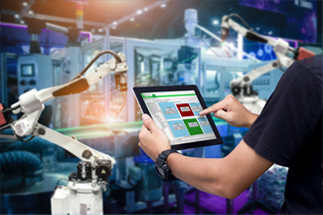20th May 2024
Introduction to Industrial Automation: Driving Efficiency and Innovation in Modern Industries
Industrial automation is revolutionizing the way companies operate, enhancing efficiency, and paving the path for innovation across various sectors. At Texnite, we specialize in delivering urgently needed industrial automation and motion control parts, ensuring that businesses stay ahead in today's competitive landscape. In this introduction, we'll explore the core aspects of industrial automation, its significance, and the basic components that make it indispensable.
What is Industrial Automation?
Industrial automation refers to the use of control systems, such as computers or robots, and information technologies for handling different processes and machinery in an industry to replace a human being. It is the second step beyond mechanization in the scope of industrialization. Enhancing productivity, reducing costs, and improving quality are the key benefits that automation brings to the table.
Importance of Industrial Automation
The importance of industrial automation lies in its capacity to optimize operations and promote growth:
- Efficiency: Automation significantly increases the efficiency of manufacturing processes by minimizing downtime, reducing errors, and maintaining consistent operations around the clock.
- Safety: By handling dangerous tasks, automation reduces the risk of injury, creating a safer work environment.
- Quality: Automated processes ensure that each product is manufactured with the same specifications and standards, reducing variability and enhancing quality.
- Scalability: Automation allows businesses to adjust their production levels and handle varying demands without a corresponding increase in labor costs.
- Innovation: Automation fosters innovation by integrating advanced technologies like AI and IoT into traditional manufacturing processes.
Basic Components of Industrial Automation
Industrial automation systems are built upon several key components that integrate seamlessly to manage automated tasks:
- Sensors: Detect environmental inputs and provide data to adjust processes.
- Controllers: Act as the central processing unit, making decisions based on data gathered by sensors.
- Actuators: Execute actions based on commands from the controllers, such as moving a robotic arm.
- Drives: Power motors in the system, crucial for moving parts like conveyors.
- Human Machine Interface (HMI): Allow human operators to interact with the system, providing insights and controls.
- Communication systems: Enable the different parts of the system to communicate with each other efficiently and reliably.
Texnite: Your Partner in Industrial Automation
At Texnite, we understand the urgency and precision required in the industrial automation sector. Specializing in the provision of discontinued, obsolete, or hard-to-find parts, as well as those with extended lead times, we are your reliable partner in keeping your automation systems running without a hitch. Our commitment to quick response and fast delivery ensures that you get the parts you need when you need them, minimizing downtime and maximizing productivity.
For more information on how we can assist you with your industrial automation needs, visit our website at www.texnite.com or contact us directly through our customer service channels. Let Texnite help you navigate the complexities of industrial automation with ease and expertise.

